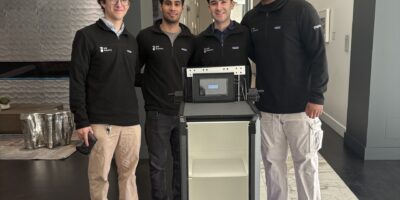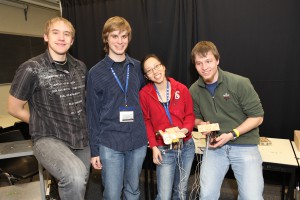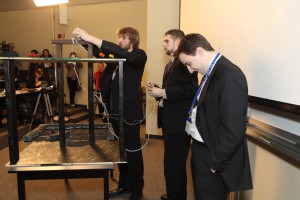Despite the ability to see many of the events from the ongoing video feed, the real action was in the collaboration and team work that went on before most of the final presentations. For both the Senior Design Competition and Consulting Engineering Competition, contestants had to work over night on Friday into the wee hours of Saturday morning. Those in the Senior Design category were responsible for building a model that would descend into a simulated mine, attain a desired rock specimen, and come back to ground level with the specimen intact. This event was filmed by a crew from the Discovery Channel, who followed different teams as they went through the different stages of the competition. This year there was a very large turnout to the Senior Team Design prototype demonstrations and presentations. There were a number of local observers and a few from the GTA region who drove in just to get an idea of what engineering is all about. Waterloo A and B both presented great designs, one of which functioned fully, and one which did not. In the end, the first place award for Senior Team Design went to the team from Laurentian University and the winners of the Consulting Engineering category were the engineering students from The University of Western Ontario. One of the team’s representing Waterloo B Society came in second place in Consulting Engineering and will also be moving on to represent our school at the CEC in March.
They weren’t the only ones to take home awards though. The University of Toronto took home the first place prize for Junior Team Design where competitors were tasked with creating a prototype to carry small logs of wood from one point to another, through a simulated lake. One of the Waterloo teams had a rather ingenious design using one motor and “four wheel drive” through the gear workings of elastic bands. Quite differently, another team also representing Waterloo created a rover with only 2 wheels located at the front and a back end that slid along the ground. Both teams used paddle flaps on the wheels for propulsion through the water. The University of Waterloo had a very strong representation in this category and one of the teams won third place overall.
Aside from the typical technical engineering competitions, there was also a Parliamentary Debates competition. In this style of debating, teams of two argue in a structured format over a resolution given to them shortly before each round. The University of Waterloo took the lead in this competition, after a gruelling final debate against the University of Toronto.
Combining both the technical and communications aspect was the Engineering Communications competition. In this category, individuals or teams give a technical presentation on a topic of their choice to a panel of judges. Waterloo came in a very respectable 2nd place in this competition with a presentation on the “Performance Comparison of Hot Mixed Asphalt versus Warm Mixed Asphalt and Their Effects on the Environment”.
The final competition category is one that requires significant preparation and planning by the competitors ahead of time. For Innovative Design, teams have a setup similar to that of a trade show booth and showcase a new or improved product that could be potentially marketed. The students from the University of Waterloo placed 3rd in this category with their idea and prototype for a high-altitude imaging system. Congratulations to the team University of Ottawa who took the lead in Innovative Design.
After a long day’s work at the competition, all the participants headed back to the Delta Hotel where the competition guests were being hosted and attended an awards banquet to end the event. The banquet environment had a huge contrast when compared to last year’s OEC, with a newly added focus on the audio and visual presentation. As soon as guests entered the banquet, they found themselves presented with a lavish stage placed between two large projection screens and camera crews capturing the entire event. Guest speakers included David Johnston (the president of the University of Waterloo), Peter Braid (Member of Parliament for the Kitchener-Waterloo region), and the keynote speaker Larry Smith (professor of Economics at the University of Waterloo). The banquet proved to be a very flashy conclusion to a prestigious engineering event.
Overall, the event was a great opportunity for all. The competitions were well organized, the schedule ran very smoothly, and aside from the frigid air seeping into DC every time someone walked through the huge sliding doors, it was a superbly hosted conference. Congratulations to Stephen Lake (chair of the OEC 2010), the OEC organizing committee, and all the students representing the University of Waterloo for putting on a great event and showing off how wonderful our school is. Well done Waterloo!





Leave a Reply